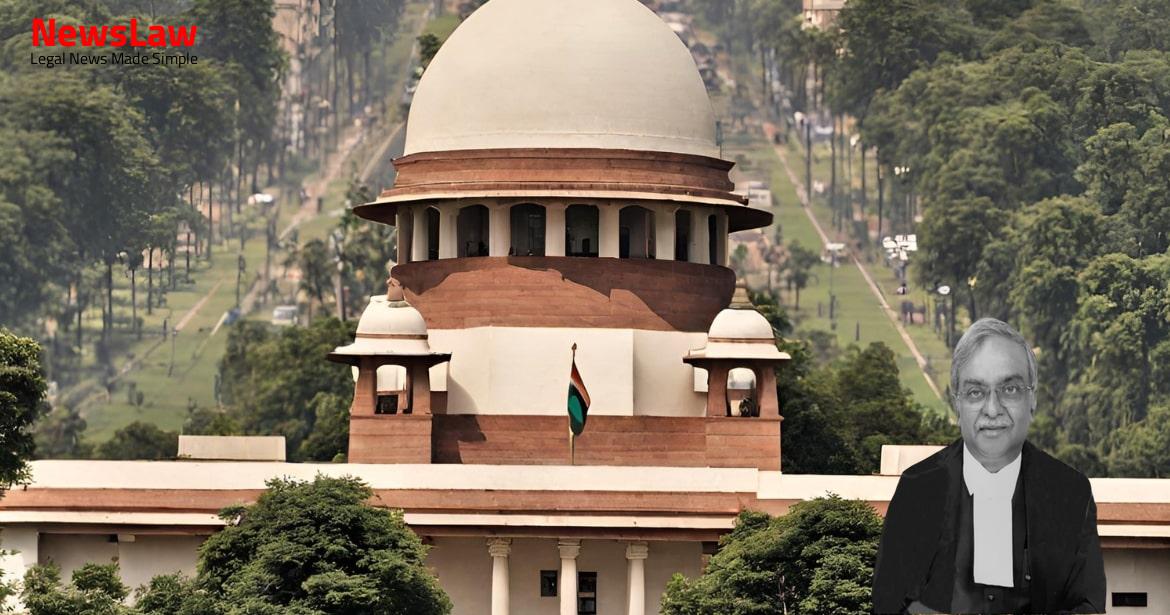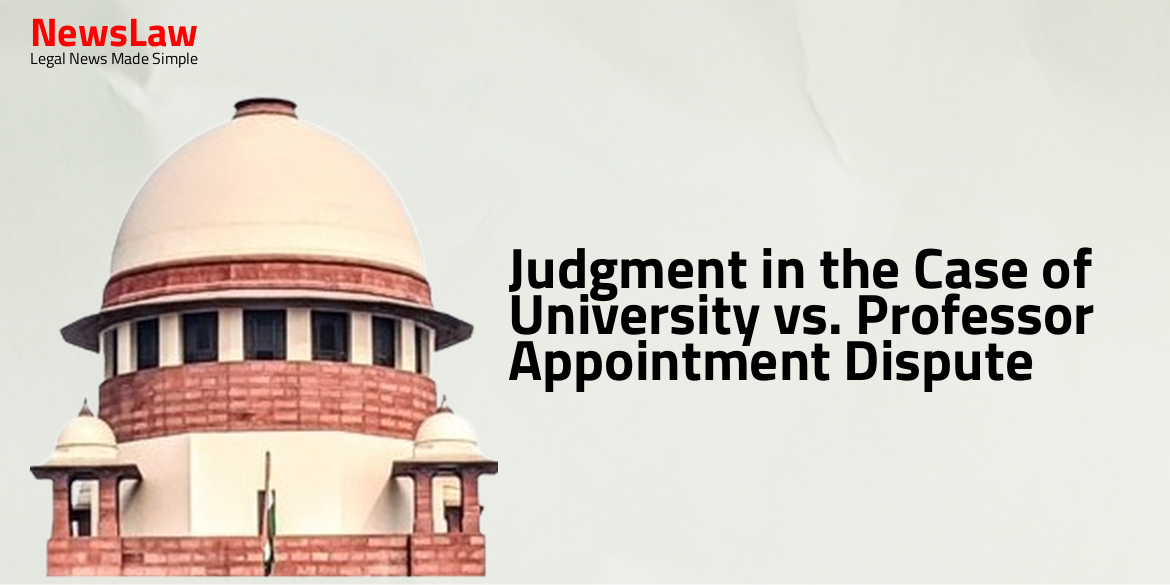In a highly contested legal battle, the Supreme Court of India has delivered a groundbreaking verdict in the case of Colonel (the petitioner) versus Teacher (the respondent) regarding the custody of the Minor Children, SSU and SSH. The court’s judgement sheds light on crucial aspects of family law and custody rights. Let’s delve into the details of this significant legal battle.
Facts
- Marriage between the Appellant, now a Colonel in the Indian Armed Forces, and the Respondent, a teacher, was solemnized in 2002.
- Two minor children were born from the marriage – a daughter (SSU) and a son (SSH).
- In December 2013, the Appellant was posted to Jammu and Kashmir while the Respondent and Minor Children resided in New Delhi.
- The High Court granted shared custody of the Minor Children in the Impugned Order.
- The custody petition filed by the Appellant was transferred to the Family Court in Delhi by the Supreme Court.
- Family Court granted interim custody of the Minor Children to the Respondent.
- Appellant challenged the Interim Custody Order through a writ petition in the High Court.
- Respondent filed a petition under Guardian and Wards Act seeking custody of the Minor Children.
- Expenses for the children’s travel were defined based on the parent’s station of posting.
- Appellant filed a custody petition before the Family Court in Bikaner, Rajasthan.
- The present appeal by the Appellant challenges the correctness of the Impugned Order passed by the High Court.
- High Court initially stayed the operation of the Interim Custody Order on 06.12.2017
- High Court granted custody of the Minor Children to the Respondent on alternative weekends on 19.04.2018
- High Court dismissed the appeal and vacated the order partly allowing the appeal by the Respondent on 01.10.2019
- Family Court granted permanent custody of minor children to the Appellant and provided visitation rights to the Respondent in GP No 45/17
Also Read: Jatinder Kumar Sapra vs. Anupama Sapra: A Landmark Supreme Court Judgment on Marriage Dissolution
Arguments
- Appellant’s counsel argued that the Minor Children have been living happily with him for almost nine years and have expressed their desire to continue residing with him.
- The Appellant is accused of alienating the Minor Children from their mother, the Respondent.
- It is claimed that the Respondent, being a teacher, can provide a stable environment for the Minor Children compared to the Appellant, a serving officer in the armed forces who is due to be transferred to a field station.
- The preference of the Minor Children to stay with the Appellant has been communicated to various courts.
- The Family Court’s decision in favor of the Appellant was described as thorough and well-reasoned, taking into account the evidence on record.
- The Appellant’s arguments were supported by legal precedents like Jitender Arora v. Sukriti Arora, Nil Ratan Kundu v. Abhijit Kundu, Mausami Moitra Ganguli v. Jayant Ganguli, Vishnu v. Jaya, and Lahari Sakhamuri v. Sobhan Kodali.
Also Read: State of Madhya Pradesh v. Land Possessors: Title Dispute Legal Battle
Analysis
- The Court emphasized the need for regular and frequent contact with each parent for the children, as well as shielding from parental hostility.
- The Court acknowledged the strong desire of the children to reside with the Appellant based on their interactions over the years.
- The Court highlighted the importance of considering various factors including socio-economic opportunities, healthcare, physical surroundings, and the preferences of the Minor Children as mandated by law in deciding the custody case.
- The court noted that most family judges consider ‘parental alienation’ as unhelpful and focus on specific behaviors within individual families.
- The Court engaged with the Minor Children multiple times to understand their preferences, intelligence, and overall well-being.
- The Court rejected the notion of ‘parental alienation syndrome’ and emphasized the importance of individual instances of alienating behavior.
- The Court considered the stability and welfare of the children as crucial factors in determining guardianship.
- The Court stated that the principal consideration in guardianship cases is the welfare of the children, and not simply interpreting legal provisions.
- The Court underscored the complexity of ‘parental alienation’ and the need for thorough consideration before labeling a parent as propagating such behavior.
- Section 17 of the Act outlines the matters to be considered by the Court in appointing a guardian for a minor.
- The Court is guided by what appears to be for the welfare of the minor, in accordance with the law applicable to the minor.
- Factors considered include the age, sex, and religion of the minor, as well as the character and capacity of the proposed guardian.
- The Court also takes into account the proposed guardian’s nearness of kin to the minor, any wishes of a deceased parent, and existing or previous relations of the proposed guardian with the minor or his property.
- If the minor is capable of forming an intelligent preference, the Court may consider that preference.
- The welfare and wellbeing of the child should be the paramount consideration in selecting a guardian for a minor.
- Courts should consider relevant statutes and rights while deciding custody of a minor.
- The contention that if the father is not unfit to be the guardian, then the welfare of the child does not arise is misleading.
- Court shall not appoint a guardian against their will.
- Parameters of ‘welfare’ were enunciated in Nil Ratan Kundu case.
- The term ‘welfare’ should be construed in the widest sense, including both moral/ethical welfare and physical well-being of the child.
- Welfare of the children overrides the parents’ rights in custody matters.
- Courts must consider the minor’s preference if they are old enough to form an intelligent judgment, but the final decision rests with the court.
- Father’s fitness is determined in relation to the welfare of the children and cannot override their well-being.
- In custody cases, physical comforts should not override moral and ethical values.
- The High Court erred in law and fact by relying on a misdirected decision and interfering with the Family Court’s custody order.
- Custody of the Minor Children is retained by the Appellant with visitation rights granted to the Respondent.
- The appeal is allowed, and the Impugned Order is set aside.
- The Appellant was not engaged in ‘alienating behavior’ as alleged by the Respondent, as no instances were identified by any Court.
- The High Court failed to appreciate this nuance and proceeded on an unsubstantiated assumption regarding parental alienation allegations.
Also Read: State of U.P. v. Shahid Ali: Landmark Judgment on Culpable Homicide
Decision
- The appellant and the respondent shall share custody of the minor children ‘SSU’ and ‘SSH’.
- The appellant entitled to have overnight custody on the second and fourth weekends of every month till the start of the next academic session.
- Arrangements for accommodation to be made by the appellant at a guest house in the Cantonment Area.
- Interaction with the minor children through audio-video call daily for half an hour between 7:00 PM to 8:00 PM.
- Children to be dropped at the respondent’s accommodation at the end of the second week of every month.
- In case of respondent being posted in the NCT of Delhi, custody to be shared for two weeks each including weekends every month.
- Expenses for to and fro journey on the fourth weekend of each month to be borne by the appellant.
- Children to stay with the appellant for the first two weeks and with the respondent for the next two weeks of every month.
- Children to be returned by flight available on Sunday evening.
- Handing over custody of the children on the evening of Friday, after arrival.
- Appellant to ensure admission of children at Delhi Public School, Gurugram, Haryana where she is currently teaching.
- Appellant to have custody of the children in Delhi after admission is secured.
- Respondent to have overnight custody on the second and fourth weekend of every month.
- Arrangements for accommodation in Delhi to be made by the respondent on his own expenses.
- Children to be brought to Delhi or sent by flight on the fourth Friday of every month.
- Permanent custody of the children to remain with the respondent.
Case Title: COL. RAMNEESH PAL SINGH Vs. SUGANDHI AGGARWAL (2024 INSC 397)
Case Number: C.A. No.-006137-006137 – 2024



